Wild Bastards takes every ingredient that made up BioShock's Irrational Games and blends it with cowboy beans
This upcoming roguelike FPS shares the off-kilter character that made Void Bastards memorable.
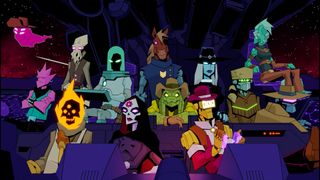
"Oh we heard of you Wild Bastards," says Eugene. The robot wears a steel Stetson and an apron, and he means the swear as a compliment. He might look mean, with his single, flat brow and pink glowing eyes—but Eugene's ire is reserved for our common enemy, the Chasteners.
Led by the lawman Jebediah Chaste, these cruel cowpokes have been rounding up and killing those who don't fit the boots of conformity—robots, xenos, and other undesirables. They've driven the Wild Bastards to the fringe of extinction, and no wonder: our troupe of outlaws could hardly be more heretical. Spider Rosa has four arms, all the better for reloading one revolver while firing the other; Smoky's head and hands are on fire, all of the time; Doc Casino, meanwhile, is a walking craps table with cards glowing where his eyes ought to be.
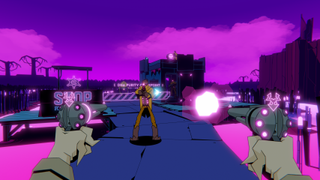
Thankfully, just as the luck of the Bastards finally runs out, a sentient spaceship named The Drifter shows up to help. "The Drifter sails on silver wings," says Rosa, "to them what need the peace it brings." From that point on, the ship warps the surviving Bastards between sectors of space, where they dig up fallen comrades one-by-one and bring them back to life.
It's a fittingly wild premise for this sort-of-sequel to 2019 strategy-shooter Void Bastards. Like its half-namesake, Wild Bastards slots fleeting first-person gunfights into a roguelike structure. Your quest is to resurrect all 13 Bastards and return the Homestead, where, as Rosa puts it with typical poeticism, "there isn't a law against a body being who they are—just silver stars, and clean blue marbles to live on". But you're regularly waylaid by the Chasteners, who take every chance they get to disable your warp drive and force you down onto nearby planets for showdowns.
Every planetary visit is an extended escape sequence—in which you navigate a turn-based map to dodge patrolling enemies and pilfer resources, before squaring up to Chasteners in FPS battles at roadblocks. Where the fights of Void Bastards took place in the tight corridors of space stations, here you're scrapping on the surface—crouch-walking through swamps, climbing water towers and taking potshots through the windows of saloons.
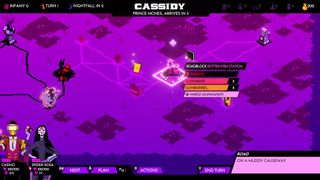
As a fan of developer Blue Manchu's previous games, it's this step outside that most worried me about Wild Bastards. It's relatively easy for a procedurally generated level to convince when it's made up of rectangular modules on a spaceship. Less so when it's smushing together complicated pieces of terrain in a natural environment.
The studio appears to have cracked the code, however. Every time I stepped into one of its showdown arenas, I was able to focus on the firefight at hand, since the backdrop was never muddled in the way I'd feared it might be. At the same time, I was impressed by the use of verticality, and the holographic signs that flickered in place of frontier shop signs.
The biggest gaming news, reviews and hardware deals
Keep up to date with the most important stories and the best deals, as picked by the PC Gamer team.
Blue Manchu's pedigree goes all the way back to Irrational Games, and that immersive sim DNA is tangible in battle. Enemies don't automatically know where you are, instead shouting back and forth to each other as they attempt to locate you through sound or snatched glimpses. This cat-and-mouse setup suits the setting—leading to long, tense moments with your finger resting on the trigger, before the sudden resolution of a few squeezed shots to the temple.
Flashbang
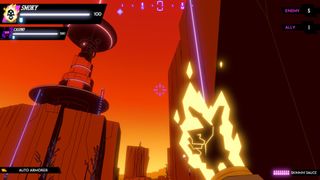
Encounters are often over in a flash, but can quickly tip in your enemy's favour thanks to surprising AI behaviour. The Gunhands pop in and out of cover as you'd expect, but the Kyotes—doglike opponents roughly reminiscent of Half-Life's Houndeyes—move to flank you in packs, penetrating your armour with short-range sonic blasts. More deadly still are the Rattlers: snakes which pop up out of the ground to spit poison. Listening for the rumble of disturbed soil is your best chance of beating them.
You bring two Bastards into a showdown, but for complicated sci-fi reasons, only one fights at a time. You switch between each character on the fly, as if they were a different battle stance. Tap a button, and you'll instantly get access to the other Bastard's weapons and special abilities—like Smoky's arced fireballs, or The Judge's crit-dealing sniper rifle. It might sound confusing, but is simple enough in practice—pulling on all the gun-swapping instincts gleaned from other shooters.
Before long, you'll learn to 'protect' a Bastard low on health by switching to their comrade. Once one of your soldiers is down, they're out of commission until you can get off the planet, leaving you feeling very vulnerable indeed. That vulnerability is only compounded by Jebediah Chaste's failsons—one of whom will show up on horseback to chase you across the map if you spend too long traversing a planet.
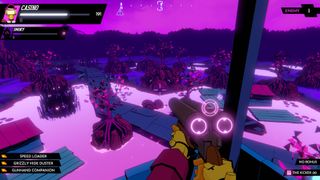
This constant state of escape brings to mind Irrational's XCOM shooter, as it was first revealed in 2010. Blue Manchu founder Jon Chey had a hand in that game's design, which put you on the back foot as more and deadlier aliens piled into a level. Though ultimately reworked into something very different as The Bureau, once you know the connection, you can see XCOM everywhere in Wild Bastards.
There's a strong focus on research: take a detour to pick up data about your enemies and you'll be given clues as to their AI quirks and weaknesses. Then there's the changing geography of the randomly-generated battle sites—and the fact that Bastards can be injured, pushing you to try out different combinations of soldiers and form new bonds. It's a game that flits between sober strategic planning and the consequences of split-second decisions made in the heat of combat.
A stew of strange and contrasting flavours, then. But this first sip has given me every reason to believe Wild Bastards might be delicious.
Most Popular

